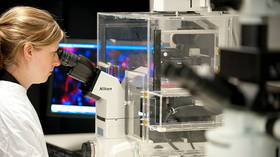Cancer-fighting nanomeds can do more harm than good, new research says

Cancer researchers have discovered that nanomedicine custom-designed to target and kill harmful cells may, in fact, accelerate the disease’s spread.
Nanoparticles are tiny particles found in everyday products like sunscreen; some even find their way into processed food through things like additives. Researchers at the National University of Singapore (NUS) studying breast cancer treatments have discovered that such nanoparticles contained within cancer-fighting medications, widen the micrometer-sized gaps in blood vessels, essentially opening the door for cancer cells to run rampant through the circulatory system.
Also on rt.com Sri Lanka halts imports of Johnson & Johnson baby powder over concerns about cancer-causing asbestosThanks to this ‘leakiness’, cancer cells can more easily and quickly spread from their primary location elsewhere in the body. It also allows cancer cells to escape the circulatory system entirely and spread to other bodily systems, further complicating treatment and exacerbating the very disease they sought to treat.
The findings show that long-term exposure to nanoparticles could accelerate cancer even if nanomedicine has not been administered to that patient, said research co-author Associate Professor David Leong from the Department of Chemical and Biomolecular Engineering at NUS Faculty of Engineering.
Also on rt.com Canada sees no cancer risk from Monsanto’s Roundup weed killerHowever, in potentially more positive news, the team is now investigating whether the phenomenon could be harnessed to deliver other drugs, or even stem cells, in different treatments that may not have otherwise been able to penetrate certain areas of the body.
Think your friends would be interested? Share this story!














